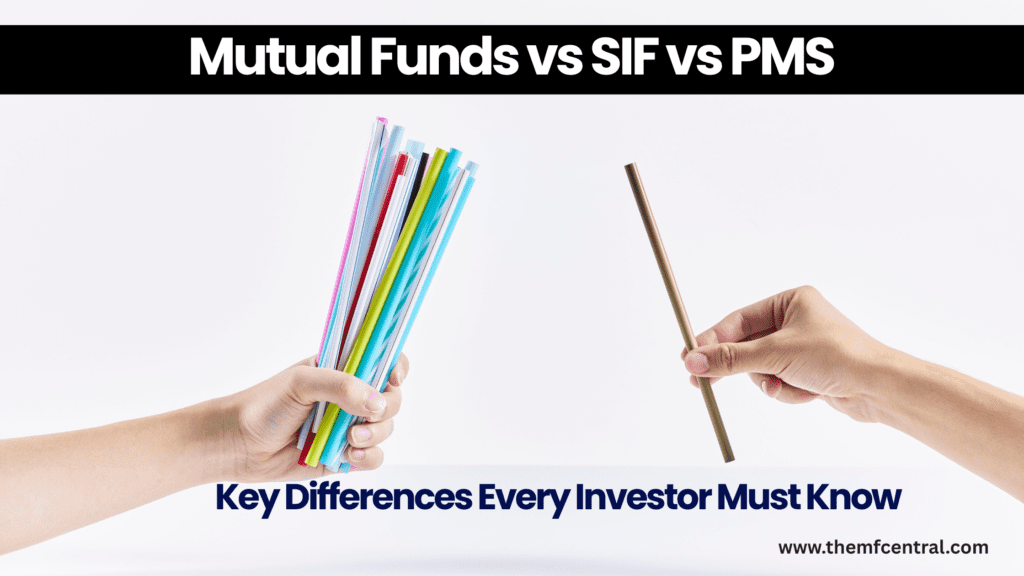Mutual Funds vs SIF vs PMS
Key Differences Every Investor Must Know
Explore the detailed comparison between Mutual Funds (MF), Specialized Investment Funds (SIF), and Portfolio Management Services (PMS). Understand suitability, investment limits, tax implications, risk levels, and more to choose the right option for your financial goals.
Mutual Funds vs Specialized Investment Funds vs PMS
A Comprehensive Guide
When it comes to building wealth and managing financial portfolios, understanding the differences between Mutual Funds (MF), Specialized Investment Funds (SIF), and Portfolio Management Services (PMS) is crucial. Below is a detailed comparison to help investors make the right choice based on capital, strategy, and risk appetite.
📊 Tabular Comparison of MF vs SIF vs PMS 📊
| Feature | Mutual Funds (MF) | Specialized Investment Funds (SIF) | Portfolio Management Services (PMS) |
|---|---|---|---|
| Suitability | Retail Investors, HNIs | Savvy Investors & HNIs | HNIs |
| Minimum Investment | ₹100 – ₹5,000 | ₹10 lakh | ₹50 lakh |
| Structure | Open-ended, Close-ended | Open-ended, Close-ended, Interval-based | Usually Open-ended |
| Holding Mode | Physical or Demat | Physical or Demat (likely) | Demat Only |
| Asset Class & Categories | Equity, Debt, Hybrid, Commodity, REIT, INVIT (37 categories) | Equity, Debt, Hybrid, REIT, INVIT across 7 strategy categories | Equity, Debt, Hybrid, Commodity, REIT, INVIT |
| Stock Concentration | Up to 10% in a stock, 25% in a sector | Similar to Mutual Funds | Most Flexible |
| Derivatives Usage | Arbitrage purposes only | Speculation (up to 25%), Hedging & Arbitrage | Hedging and Arbitrage |
| Risk Level | Varies: Low (Debt) to High (Equity) | Higher than MF/PMS depending on strategy | Generally High for Equity PMS; Moderate to Low for others |
| Risk Assessment | Risk-o-Meter (Low to Very High) | Risk Band (1–5 levels), updated monthly | Custom risk profiling per investor |
| Redemptions | Anytime for open-ended; at maturity for close-ended | Depends on strategy: daily to annually | Based on PMS agreement |
| Redemption Notice Period | No notice required | May require up to 15 working days | Varies by PMS provider |
| Portfolio Disclosure | Monthly | Alternate months | Monthly |
| Tax on Redemption | Capital Gains Tax | Similar to MF; clarity needed on derivative classification | Individual security level tax on each sale |
| Certification Required | NISM Mutual Fund Distributors Certification | NISM MF Distributors + Derivatives Certification | NISM Portfolio Management Services Certification |
✅ Choosing the Right Option
Mutual Funds: Best for retail investors seeking simplicity, diversification, and lower capital requirements.
Specialized Investment Funds: Ideal for experienced investors or HNIs comfortable with higher risk and seeking exposure to advanced strategies.
PMS: Designed for wealthy investors requiring tailored portfolio management, greater control, and flexibility.
Below is a comparative table outlining the eligibility and certification requirements for distributing Specialized Investment Funds (SIFs), Portfolio Management Services (PMS), and Mutual Funds in India:
| Investment Product | Mandatory Certification | Exam Details | Additional Requirements |
|---|---|---|---|
| Specialized Investment Funds (SIFs) | NISM-Series-XIII: Common Derivatives Certification Examination | Purpose: Establishes a knowledge benchmark for distributors of SIFs. Eligibility: Entities engaged in the sale and/or distribution of Mutual Fund products. Exam Structure: 100 multiple-choice questions; total marks: 100. | – Distributors must be registered with the Association of Mutual Funds in India (AMFI). – Compliance with SEBI regulations is mandatory. – Additional requirements, if any, are not specified in the available sources. |
| Portfolio Management Services (PMS) | NISM-Series-XXI-A: PMS Distributors Certification Examination | Purpose: Establishes a knowledge benchmark for distributors of PMS. Eligibility: Individuals engaged in the distribution of PMS. Exam Structure: 100 multiple-choice questions; total marks: 100. Passing Score: 60%. Negative Marking: 0.10 marks deducted for each incorrect answer. Duration: 2 hours. Validity: 3 years. | – Distributors must comply with SEBI regulations. – Completion of Continuing Professional Education (CPE) programs is required for certification renewal. – Additional requirements, if any, are not specified in the available sources. |
| Mutual Funds | NISM-Series-V-A: Mutual Fund Distributors Certification Examination | Purpose: Establishes a knowledge benchmark for mutual fund distributors. Eligibility: Individuals above 18 years of age; no specific educational qualifications required. Exam Structure: 100 multiple-choice questions; total marks: 100. Passing Score: 50%. Negative Marking: None. Duration: 2 hours. Validity: 3 years. | – Registration with AMFI is mandatory to obtain an AMFI Registration Number (ARN). – Completion of CPE programs is required for certification renewal. – Additional requirements, if any, are not specified in the available sources. |
Note: The information provided is based on the available sources and may be subject to change. For the most accurate and up-to-date information, please refer to the official websites of SEBI and NISM.
| Type of Exam | Mandatory NISM Certification Exam |
|---|---|
| Mock Test Free (SIFs) | NISM-Series-XIII: Common Derivatives Certification Examination |
| Mock Test Free (PMS) | NISM-Series-XXI-A: PMS Distributors Certification Examination |
| Mock Test Free (Mutual Funds) | NISM-Series-V-A: Mutual Fund Distributors Certification Examination |
